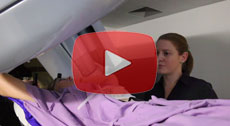Radiation therapy
Radiation therapy is the use of high energy x-rays (called ionising radiation) to treat cancer.
About radiation therapy
Radiation therapy uses high dose radiation to damage cancer cells and stop them from growing and dividing. Cancer cells are less able to repair themselves after radiation damage than normal cells.
It is used to improve the chance of cure or to control the growth of cancer cells.
Radiation therapy may be used alone or in combination with other treatments such as chemotherapy or surgery to improve the overall effectiveness of treatment.
Sometimes it is given to reduce the symptoms of cancer and to improve quality of life, this is known as palliation.
Radiation Therapy is a localised treatment for the disease you have been diagnosed with. The radiation is not applied to your whole body unless this is a requirement for your treatment.
Types of radiation therapy
The type of radiation therapy you receive will vary depending on your needs. Your treatment team will design the optimal treatment option based on your circumstances.
Looking after yourself during radiation treatment
Nutrition
It is important to eat a well-balanced diet to help you stay well nourished. Good nutrition can help you cope better with the side effects of treatment, help wounds and damaged tissues heal, improve your immune system, and help maintain your weight and muscle strength. Treatment side effects may occur that make eating and drinking difficult for you.
If you have multiple appointmetns
A Dietitian is available should you have any concerns with your eating or weight loss or gain during treatment.
Nutrition resources
- Nutrition Education Material Online (NEMO)
- Memorial Sloan Kettering Cancer Centre – Herbs, botanicals and Other products
Hydration
It is important to:
- maintain your daily daily water intake at 2 litres/day
- always carry a water bottle with you
- take small sips frequently
Exercise
Light or gentle exercise during treatment is OK. Swimming in chlorinated pools is not recommended.
You should ask your doctor for more information.
Emotional support
A diagnosis of cancer can be a difficult and challenging time for you and the people who care for you. It may affect your physical, emotional and financial well being. It can be helpful to talk to someone. We have put together a list of resources to support patients, carers and families.
Managing side effects
Side effects from your radiation therapy will only occur in the area of your treatment
Important: Contact your doctor or nurse if you have:
- a temperature of 38°C or higher
- pain in the treatment area
- pain or burning when passing urine and this is your area of treatment
- diarrhoea
- bowels not opening for 2 days (or what is outside your normal routine)
- severe or persistent vomiting that prevents eating and drinking for more than 24 hours
- bleeding that does not stop
- feeling generally unwell
- persistent headaches
After hours – go to your nearest emergency department

